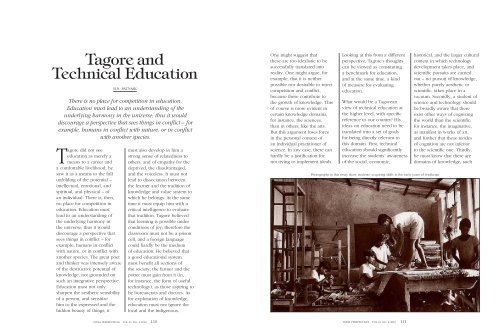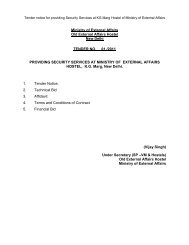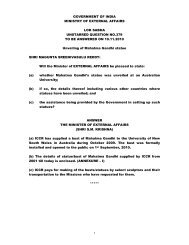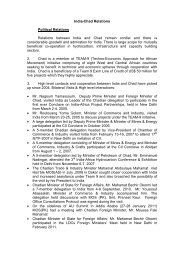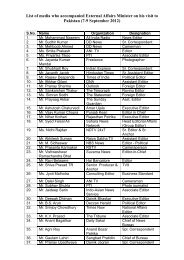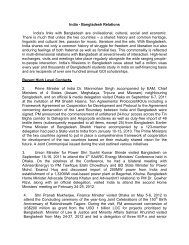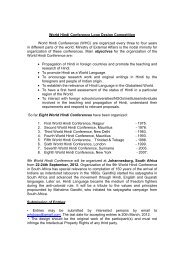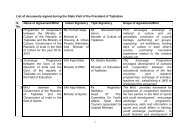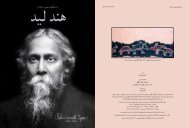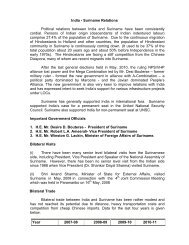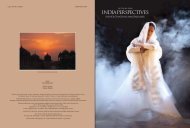IP_ Tagore Issue - Final.indd - high commission of india mauritius
IP_ Tagore Issue - Final.indd - high commission of india mauritius
IP_ Tagore Issue - Final.indd - high commission of india mauritius
Create successful ePaper yourself
Turn your PDF publications into a flip-book with our unique Google optimized e-Paper software.
<strong>Tagore</strong> andTechnical EducationB.N. PATNAIKThere is no place for competition in education.Education must lead to an understanding <strong>of</strong> theunderlying harmony in the universe; thus it woulddiscourage a perspective that sees things in conflict – forexample, humans in conflict with nature, or in conflictwith another species.<strong>Tagore</strong> did not seeeducation as merely ameans to a career anda comfortable livelihood; hesaw it as a means to the fullunfolding <strong>of</strong> the potential –intellectual, emotional, andspiritual, and physical – <strong>of</strong>an individual. There is, then,no place for competition ineducation. Education mustlead to an understanding <strong>of</strong>the underlying harmony inthe universe; thus it woulddiscourage a perspective thatsees things in conflict – forexample, humans in conflictwith nature, or in conflict withanother species. The great poetand thinker was intensely aware<strong>of</strong> the destructive potential <strong>of</strong>knowledge, not grounded onsuch an integrative perspective.Education must not onlysharpen the aesthetic sensibility<strong>of</strong> a person, and sensitizehim to the expressed and thehidden beauty <strong>of</strong> things, itmust also develop in him astrong sense <strong>of</strong> relatedness toothers, and <strong>of</strong> empathy for thedeprived, the disadvantaged,and the voiceless. It must notlead to dissociation betweenthe learner and the tradition <strong>of</strong>knowledge and value system towhich he belongs. At the sametime it must equip him with acritical intelligence to evaluatethat tradition. <strong>Tagore</strong> believedthat learning is possible underconditions <strong>of</strong> joy; therefore theclassroom must not be a prisoncell, and a foreign languagecould hardly be the medium<strong>of</strong> education. He believed thata good educational systemmust benefit all sections <strong>of</strong>the society; the farmer and thepotter must gain from it (in,for instance, the form <strong>of</strong> usefultechnology), as those aspiring tobe bureaucrats and doctors. Asfor exploration <strong>of</strong> knowledge,education must not ignore thelocal and the indigenous.One might suggest thatthese are too idealistic to besuccessfully translated intoreality. One might argue, forexample, that it is neitherpossible nor desirable to rejectcompetition and conflict,because these contribute tothe growth <strong>of</strong> knowledge. This<strong>of</strong> course is more evident incertain knowledge domains,for instance, the sciences,than in others, like the arts.But this argument loses forcein the personal context <strong>of</strong>an individual practitioner <strong>of</strong>science. In any case, there canhardly be a justification fornot trying to implement ideals.Looking at this from a differentperspective, <strong>Tagore</strong>’s thoughtscan be viewed as constitutinga benchmark for education,and at the same time, a kind<strong>of</strong> measure for evaluatingeducation.What would be a <strong>Tagore</strong>anview <strong>of</strong> technical education atthe <strong>high</strong>er level, with specificreference to our country? Hisideas on education need to betranslated into a set <strong>of</strong> goalsfor being directly relevant tothis domain. First, technicaleducation should significantlyincrease the students’ awareness<strong>of</strong> the social, economic,Photographs in this essay show students’ acquiring skills in the early years <strong>of</strong> Sriniketanhistorical, and the larger culturalcontext in which technologydevelopment takes place, andscientific pursuits are carriedout – no pursuit <strong>of</strong> knowledge,whether purely aesthetic orscientific, takes place in avacuum. Secondly, a student <strong>of</strong>science and technology shouldbe broadly aware that thereexist other ways <strong>of</strong> cognizingthe world than the scientific;for instance, the imaginative,as manifest in works <strong>of</strong> art,and further that these modes<strong>of</strong> cognition are not inferiorto the scientific one. Thirdly,he must know that there aredomains <strong>of</strong> knowledge, suchINDIA PERSPECTIVES VOL 24 NO. 2/2010 110 INDIA PERSPECTIVES VOL 24 NO. 2/2010 111


